Securing Anies Baswedan’s Support
Pramono Anung successfully secured Anies Baswedan’s support in the Jakarta gubernatorial election. There seems to be a political deal ahead of 2029.
maaf email atau password anda salah

Pramono Anung successfully secured Anies Baswedan’s support in the Jakarta gubernatorial election. There seems to be a political deal ahead of 2029.
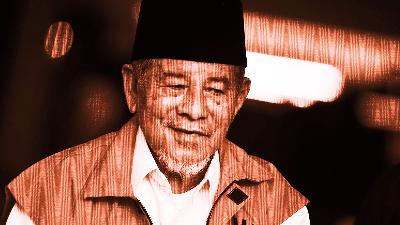
The term “Medan Block” emerged during the trial of former North Maluku Governor, Abdul Gani Kasuba. Medan Block is believed to refer to pre-allocated nickel mining concessions in Halmahera.
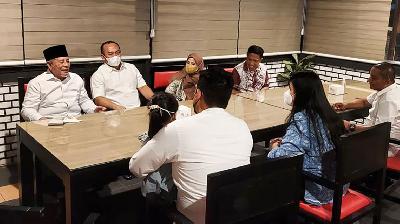
Bobby Nasution is suspected of managing the Medan Block nickel mine since 2021. He met with Abdul Gani Kasuba before becoming the Mayor of Medan.
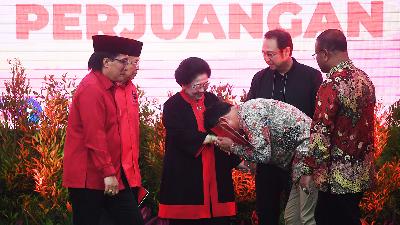
The PDI-P will be nominating Anies Baswedan in the Jakarta gubernatorial election. A popular candidate against Jokowi’s coalition.

The opportunity for Anies Baswedan to contest the Jakarta gubernatorial election is slipping away after the coalition of parties supporting him fell apart. There is a guerrilla from the Palace.

An exclusive Tempo interview with Anies Baswedan regarding his chances to run in the Jakarta regional head election.

Jokowi and Prabowo’s coalition are maneuvering to thwart Anies Baswedan’s candidacy in the Jakarta regional head election. Cabinet posts are being offered as inducements.

Chances for Anies Baswedan to run in the Jakarta regional head election are beginning to open up. A number of political parties support Prabowo Subianto intend to nominate Anies.
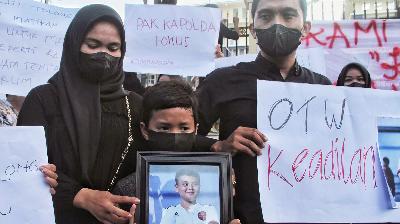
Thirteen-year-old Afif Maulana was found dead under a bridge in Padang, West Sumatra. He had allegedly been tortured by the police.

The number of Indonesian umrah minor pilgrimage travelers grows during the fasting month of Ramadan. The nation’s umrah economic potential has not been fully harnessed.

A defendant of the Supreme Court justice bribery case is allegedly subjected to extortion by someone claiming to represent the leadership of the KPK. The name Firli Bahuri is also implicated.
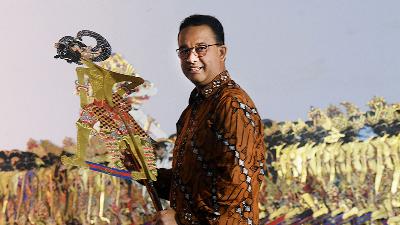
Anies Baswedan talks about the campaign. He admits there are talks with the Ganjar-Mahfud team.

The claim that the Gunung Padang site is the oldest pyramid in the world is strongly challenged. A collaboration of researchers from around the world is needed.
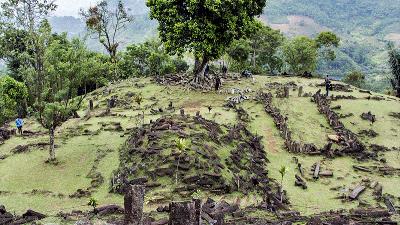
Foreign archeologists doubt the site of Gunung Padang as the world’s oldest pyramid. A journal publisher is going to investigate.

Moh. Wijdan, Head of Ketapang Jaya village, Ketapang, Sampang, East Java, replies to Pressure from the Police and Prosecutors article.

Anies Baswedan is campaigning aggressively through TikTok. It is forbidden to talk about politics and campaigns.

Several high-ranking veterans formerly supporters of Jokowi and Prabowo switched their allegiance to Anies Baswedan. Several officers held disappointment.

Anies Baswedan choses Muhaimin Iskandar to be his vice-presidential running mate. Agus Harimurti Yudhoyono is eliminated in the final turn.
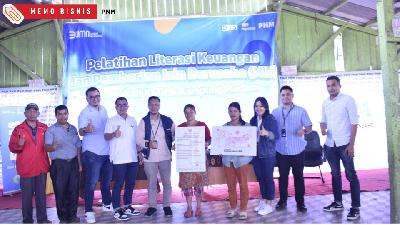
The concept of Kampung Madani is to optimize the business and economic potential of the region. #InfoTempo

A family of Sumatran tigers died after being caught in snare traps in Aceh. With a population of about 600, this endangered wild animal is threatened by poaching, loss of habitat, and conflict with humans.

Poaching produce in the North Natuna Sea is not only triggered by economic need. According to the Director of the Fleet Monitoring and Operations of the Marine and Fisheries Resources Directorate-General in the Maritime Affairs and Fisheries Ministry, Pung Nugroho Saksono, a conflict similar to the Sipadan-Ligitan case between Malaysia and Indonesia should not be allowed to recur.

Corruption Eradication Commission (KPK) investigator, Novel Baswedan, has doubts about his alleged assailant Brig. Rahmat Kadir Mahulette’s statement, calling him a traitor.

MEDAN Mayor Tengku Dzulmi Eldin’s alleged bribery case has roped in a number of parties, from bureaucrats to businessmen.

THE ivory hornbill or rangkong is a symbol of courage and bravery for Dayak community in Kalimantan. The bird is also considered a protector, and acts as the bridge which connects the souls of their ancestors with the Dayaks. Despite this, in the past three years, the population of the ivory rangkong has depleted alarmingly. In 2015, international conservation organizations announced its status as critically endangered.
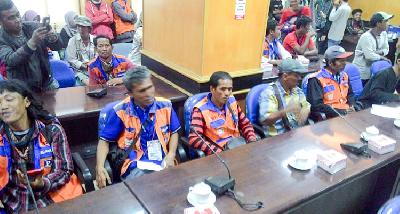
Parking attendants in Makassar were given paralegal training by the Makassar Legal Aid Institute. The program aims to improve legal awareness and embolden participants to fight corruption.

THE Civil Society Coalition has worked with Change.org to launch a petition demanding President Joko Widodo to form a joint fact-finding team (TGPF) to investigate the attack using acid against Corruption Eradication Commission (KPK) investigator Novel Baswedan.

Sartono Kartodiredjo’s dissertation Pemberontakan Petani Banten 1888 (The Peasants’ Revolt of Banten in 1888) and Catatan Harian Imam Samudra (Imam Samudra’s Diaries) were two texts that significantly influenced Jompet Kuswidananto’s work On Paradise, exhibited at the Museum of Contemporary Arts, Grand-Hornu, Belgium.

Organic coffee farming in Kiadan Plaga is the main source of income. It is also a vehicle for the village’s brand of ecotourism.~

Rizieq Syihab, charged in a pornography offense, did not show up at his scheduled questioning at the Jakarta police headquarters on April 25. He said he wanted to travel to Mecca, Saudi Arabia, to perform the lesser pilgrimage (umrah). This Grand Imam of the Islam Defenders Front (FPI) promised he would be present for questioning upon returning from the Holy Land in mid-May. However, the post-Ramadan fasting month holiday has passed and he has yet to return to Indonesia.

Anies Baswedan took advantage of the final week of the campaign to emphasize his rejection of land reclamation work on the north shore of Jakarta. On Wednesday last week, Anies, who is running for the office of the Jakarta governor, endorsed by the Gerindra Party and Justice and Prosperity Party (PKS) went to the dock in Cilincing, North Jakarta. He took part in the parade with the theme "Fishermen Reject Land Reclamation."
There were 150 ships there, each carrying 10 fishermen, which sailed in a convoy on Jakarta Bay, from Kalibaru dock to Cilincing. These fishing boats visited Island G, an island where work had once stopped, which is being worked on by the Agung Podomoro Land company. They put up a banner there which read "Reject Land Reclamation."

Friday last week was a busy day for 47-year-old Anies Baswedan, who began his day's activities from early morning. His schedule was full and it did not end until nearly midnight. "I haven't slept much," said Anies.
That day, Anies, the former education and culture minister, was selected a candidate in the Jakarta gubernatorial election, by the Gerindra Party and the Justice and Prosperity Party (PKS). His running mate is Sandiaga Uno, a Gerindra member and businessman. There was a series of events he had to attend following his nomination: the public declaration of his candidacy, registration at the Jakarta General Elections Commission (KPUD) and political meetings. At the end of that Friday, Tempo reporter Prihandoko had a chance to interview Anies about his nomination

THE four big mammals that have always been the focus of World Wildlife Fund (WWF) Indonesia, according to Arnold Sitompul, are tigers, orangutans, elephants and rhinoceroses. It is not just because they are endemic to the islands of Sumatra, Java and Kalimantan. The animals are listed by the International Union for Conservation of Nature (IUCN) as critically endangered. "These species have always been our main concern because they are endemic to Indonesia, and so they've always been our priority," Arnold told Tempo.
Out of the four endangered mammals, the most threatened are the Sumatran rhinos (Dicerorhinus sumatrensis), of which only about 300 are left in the wild. Meanwhile, the population of Sumatran elephants (Elephas maximus sumatranus) plummeted by 50 percent in less than 10 years. Arnold recently spoke to Tempo English reporter Amanda Siddharta on WWF Indonesia's efforts to conserve these iconic beasts. Excerpts:

The huge education budget20 percent of the total state budgetdemands a significant improvement in the quality of the national education system, something that Indonesians have been yearning for years. Now, it is up to Education and Culture Minister Anies Baswedan to respond to those demands.
The first step that Anies has started is publicizing all data on public education. The Education Balance Sheet publication contains information that until recently was not available to the public, such as the number of students in schools, the proportion of students to teachers, the number of damaged and broken-down schools, the quality of teachers based on teacher competence evaluations, the different education budgets between national and regional budgets, the budget allocation per student and the number of accredited schools.

This is the story of death. It is begun with somebody's death and ends with your own death. Yes, your death. No need for surprises," Faisal Oddang opens his story in his maiden novel Puya ke Puya. Death is the frame of the whole narrative, binding the subplots throughout the 218-page novel.
Yet, death here is not described in fear or anxiety. Faisal sets it with the background of the Toraja community that views death as something intimate. "Most Torajans celebrate death and keep it as close as possible in their memories," writes Faisal.

It is increasingly clear that the charges against Corruption Eradication Commission (KPK) investigator Novel Baswedan were mostly fabricated. The National Ombudsman found suspected fraud in the police investigation. The prosecution's case against Novel, concluded the Ombudsman, should not even have qualified for a court hearing.
Irregularities were first suspected when a 2004 resolved case involving Novel was regurgitated. He was, at the time, posted in a Bengkulu district police precinct and charged with allegedly allowing his subordinates to torture some bird-nest thieves. The case should have been closed after Novel was given a strong warning that same year. Unfortunately, the police dug it up when Novel, as a KPK investigator, exposed the corruption inside the National Police traffic division.

After the noon prayers, Irzal Rakhmadani, 24, packed his things in a rucksack and went out. Two items he never goes without are his stethoscope and sphygmometer. He would ride on his motorbike to the office of the World Wild Fund for Nature (WWF) in Palangkaraya, Central Kalimantan, three kilometers away. There, he would treat people suffering from the effects of forest fire smoke around Palangkaraya. In 2015, he treated some 1,000 patients.
In mid-September, Irzal and his colleagues visited a camp for workers who had been laid off by an oil palm company. Fifteen volunteers of Earth Hour Palangkaraya had gathered to help the smoke victims there. Irzal saw something that distressed him. About 300 people were crammed into a 5x15 meter barrack. Because there was not enough room, tarpaulin tents had been set up outside the barracks. People lived alongside chicken and their pet dogs.

ON the first day that Anies Baswedan began his job as minister for culture and elementary and secondary education a year ago, he knew there would be piles of work ahead of him. Among the many issues that needed to be sorted out was the scarcity of teachers in Indonesia's remote areas. Yet, statistically, there should have been enough teachers to go around. The student-teacher ratio is around 16 to 1. "That's an excess, while in South Korea, the ratio is 30 to 1. Ideally it should be 25 to 1," said Anies, admitting that the problem in Indonesia was one of unequal distribution. In some places such as Papua, the ratio dropped significantly to 75 students for every teacher. So, in May this year, the education ministry initiated the Guru Garis Depan (Frontline Teachers ) program to address the shortage of teachers in the outer parts of the country. So far, 798 teachers have been sent out to teach at 28 regencies. Next year, the number is expected to increase to 3,500. Anies discussed the Frontline Teachers initiative with Tempo English reporters Sadika Hamid, Syari Fani and Amanda Siddharta. Excerpts:

THE Energy and Mineral Resources Ministry has an ambitious plan for next year: raising the budget for the development of renewable energy by 10 times. "The future of Indonesia's development depends on seeking and building renewable energy. We can no longer rely solely on fossil fuel energy, which is bound to become scarce," said Dadan Kusdiana, director of the ministry's section on bio-energy.

A strain of wheat developed by researchers at the Andalas University School of Agriculture in Padang, West Sumatra-the Galur SO-3, or GURI 6 UNAND-has been identified as one of four superior varieties of wheat by the Cereal Plant Research Center last November.

Rice, rendang beef stew, jackfruit curry and many kinds of sambal (chili paste) sit in the front lanjar (guestroom) of Etek Nuraini's traditional rumah gadang house in Nagari Sumpur, in the Tanah Datar regency of West Sumatra. It is early in the month of February. Some 40 guests have gathered, including village elders and West Sumatra Governor Irwan Prayitno. Guests sit on the floor, eating side-by-side. Prayers are recited for the safety and wellbeing of those who will inhabit the house. Family photos hang on the wall. Windows are left open to let sunlight in.
From the vantage of the dining area, the house's spacious interior is in clear view. Six jua (Cassia siamea) pillars grace the building's 17-meter-long sides. Jua, a type of ulin ironwood, is extremely durable: once dry, its impossible to cut it down to size. The walls, meanwhile, are made of surian (Toona ciliata), and floors from bayur (pterospermum javanicum) tree trunks.

Forty young men strain and groan, taut muscles shining with sweat as they haul a jua tree (Cassia siamea) out from a ravine near Singkarak Lake, West Sumatra. The trunk is 11 meters long and will be used as the main pillar in a rumah gadang (traditional Minangkabau house). The house is being built for the heirs of Etek Siti Fatimah in the hamlet of Nagari, Sumpur village, Tanah Datar regency. Etek is what locals call an aunt, or a respected female figure.
The men take turns pulling the tree up and out of the gully. Shortly after noon, they reach the top. After clearing another small rise they toss the trunk down the other side, watching it tumble downhill.

PHOTOGRAPHS of elementary school students hang on the walls of the Ki Hajar Dewantara Building of the Elementary and Secondary Education and Culture Ministry in Jakarta. Most of them show children in remote areas, wearing shabby uniforms but genuine smiles on their faces. The photographs were put up at the request of the new minister, Anies Baswedan, who asked that they be hung everywhere, including in all meeting rooms. "So that when we meet, their faces will remind us that we work for them," said Anies, in his office last week.
Barely two months into his new assignment, Anies has created a buzz in Indonesia's education sector. He changed the function of national school examinations from determining a student's passing grade to merely a tool to measure the quality of education. A recent bombshell was when Anies halted the Curriculum 2013 and reverted to the Curriculum 2006 on December 6. He rejected the new curriculum because he noticed that teachers and schools were not ready to use it. "It's like being told to suddenly switch to an iPhone when you're used to using BlackBerry," Anies explained.

His name is Sekarpandan. He is short, with a huge behind. In Cirebon style wayang kulit, he is one of the nine clown-retainers who accompany the five Pandawa.
Sekarpandan got his bodily form after taunting Semar, who wanted to marry Sekarpandan's older sister Sudiragen. In the fight that ensued, Sekarpandan lost and was thrown into a clump of pandanus, immediately changing form: he became a replica of the person he had been taunting. Also in character.

PERHAPS he was born with a gun in his hand. At the age of 13, Benny Moerdani fought as a member of the military academy cadets. He nearly died when Dutch gunfire destroyed his rifle barrel. Fragments flew into his face, causing him to bleed profusely.
Without being trained as a paratrooper, Benny once jumped from an airplane over Pekanbaru to win back the Caltex oilfield which had been taken over by rebels from the Revolutionary Government of the Republic of Indonesia (PRRI). During a different assault in Padang, his parachute failed to open. The cord wrapped around his leg, and his body slammed against the plane's fuselage. Fortunately he was able to use his reserve chute. With his leg in a cast, he insisted on going to the battlefield.

A national research team has discovered ancient buildings and artifacts at the Mount Padang archaeological site in, Cianjur regency, West Java. The team's deputy chairman for geology, Danny Hilman Natawidjadja, said they had found a 22-centimeter-long stone rod on the mountain's southern slope, about two or three meters below the surface. The rod has pores and magnetic characteristics that attract it to metal. "It resembles Harry Potter's magic wand, which is fit for gripping," Danny said last week.
Other finds included knife-shaped metals, metal waste and burned soil with stacks of stones beneath. Based on laboratory tests, the burned residual materials have been in the location since 5,200 BC.

FOR almost a year, Hamdan Zoelva has only managed to sleep five hours a day. As the chief justice of the Constitutional Court he has had to bear the consequences of his predecessor Akil Mochtar's actions. Last year Akil was arrested, tried and sentenced to jail by the Corruption Eradication Commission (KPK). "Many people don't trust the Court anymore," said 52-year-old Hamdan.
Akil was guilty of accepting bribes from regional chief executives whose elections were in dispute. He was arrested in early October 2013, in the process of receiving money from Hambit Bintih, district chief of Gunung Emas. The case shook the Court. When Hamdan took over, public trust in the judiciary was at its lowest.

CONSTITUTIONAL Court Chief Justice Hamdan Zoelva turned red and his voice rose one decibel higher as he presided over the lawsuit submitted by the Jambi-based National Democrat Party. Two of the three witnesses had given conflicting information. When they were questioned further, they had no valid data. "It was very clear they were making it all up," Hamdan told Tempo.
The inaccurate testimony, according to Hamdan, was one among many problems in the court proceedings looking into disputes arising out of the recent legislative election. Some 700 cases submitted by political parties and legislative candidates were pending, with only three weeks to go before the deadline on June 30. "This week we will evaluate the cases so that a week before the deadline, all is in place."

The government has appointed PGN and Bakrie to complete the Kepodang-Tambak Lorok gas pipeline project. PLN has missed out on Rp3 trillion in savings.

On the eastern part of Sumba Island, Mbatakapidu village chief Jacob Tanda is synonymous with bountiful harvests. He succeeded in turning around a perennial food shortage into abundance and resilience, thanks to his innovative farming ways. He urged his villagers to plant 10 kinds of crops and to re-use the traditional barns to store food. He persuaded women active in the local Community Welfare Program (PKK), to carry out a 'love your local products' campaign. In just four years, he altered an impoverished village into a bountiful, resilient community. Tempo reporter Syari Fani flew to eastern Sumba to report on this success story on the occasion of World Food Day on October 16.

A cross-disciplinary team of scientists is studying a controversial archeological site: Mount Padang. Is it true the site is 10 times larger than Borobudur?

This is a portrait of how things have changed in the first elite neighborhood in the Dutch Indies. The area in question was formerly called Nieuw-Gondangdia. Later its name was changed to Menteng. This is where the wealthy lived, from top government officials and governors to ambassadors and businesspeople. Over the years, however, its beauty has faded. It has grown in an irregular fashion, due to the inconsistent application of city regulations, as well as its residents' lack of concern for the environment.
On this year's anniversary of the city of Jakarta, which coincides with Menteng's 100th anniversary, Tempo attempts to write extensively about Indonesia's first modern tropical residential area. This is where the Indische (Indies) architectural style originated. Not many buildings of this style exist today. Now it is a crowded, polluted area, used by motorists avoiding carpool roads. Menteng is a typical example of Jakarta's muddled zoning regulations.

In the village of Lendang Nangka, East Lombok, residents have attained self-sufficiency in their clean water supply. In addition to receiving an award for their efforts, the villages water supply has made it easier for residents to conduct their business.

The month of Ramadan (fasting) will end with the Idul Fitri holidays, a cause for joyous celebration. Young and old, the high and the low, will come together in a new beginning, marked by day-long feasting and fun. But there will also be a sobering moment of spiritual reconnection, of forgiveness and joint prayers, giving thanks to the greatness of God Almighty. At this joyous time, Tempo English Edition presents a special photo essay of Ramadan celebration in eastern Indonesia.

Artists from Indonesia used various actions to capture the attention of audiences in Berlin. Sundanese language was not an obstacle when it appeared as a performance.

Located in the middle of the World Coral Triangle, Indonesia plays an important role in determining the fate of the tuna, the highly popular food fish that is slowly but irrevocably diminishing from the earth’s oceans, no thanks to years of excessive fishing. Processing plants can no longer meet fish production capacity, fishermen must sail farther out to sea for their catches yet exports are declining. Can government regulations bring back the endangered tuna? A special report by the Tempo English Edition team.

The winner of the Rancage Literary Award was announced. Ajip Rosidi has begun to pass on the judging of Sundanese literature to his colleagues.

The Special 88 Detachment has been deployed in pursuit of the Medan Bank CIMB robbers. They are suspected of having links to former GAM members and other groups.

The high bovine mortality rate drove researchers at Nusa Cendana University to create a supplement that fattens cows and makes them resistant to disease.

How will corruption eradication fare in 2009? The optimistic will reply: “full of challenges”, while the pessimists are bound to say: “dismal”. We prefer the word “endangered”.

Lombok’s Sasak Muslims enjoy unique traditions during Ramadan.

Tan Deseng is recognized as a skilled Sundanese ethnomusicologist. He set up a workshop with ethnic-Chinese students who love Sundanese culture.

The Cendana Axis
The Ups and Downs of the Cendana Family
After Suharto stepped down, the range of business activities as well as the wealth of the Cendana family seemed to decline. But the sons and daughters of the former president still hold key positions in a number of corporations.

The Medan District Court has rejected Adelin Lis’s defense. Forestry Minister Kaban will be presented as a witness.

Researchers find pandanus (screw pine) with potential similar to buah merah on the Island of Yapen, Papua.

The grandson of former President Suharto, Danny Indra Rukmana, married celebrity Lulu Tobing. A lavish wedding was held.

THE life rhythm of this youth suddenly changed in mid-July. He is now spotlighted, photographed, interviewed and gets to meet all kinds of people. Jonathan Pradana Mailoa is receiving praises galore because he is the shining star in a nation that is going through so much darkness: earthquakes, floods, famine and that endless disease called corruption. Indonesias reputation went up a notch through the brilliance of this 16-year-old, when he became the absolute winner of the 37th International Physics Olympics, held in Singapore and participated in by 86 countries.

The World Cup ended last Sunday, but people are still talking about soccer. Not Italys victory over France, but the duel between Zinedine Zidane, the captain of the French team, and Marco Materazzi, the Italian back.

LAST month, the Philippine government began identification of Indonesian migrants in Mindanao. They were offered a choice of repatriation to Indonesia, legalization or naturalization. Legalization allows the immigrants to stay in the Philippines and retain their Indonesian citizenship while naturalization provides the migrants with full Filipino citizenship. Most of the migrants came from the islands of Sangihe and Talaud in northern Sulawesi. The forefathers of these Indonesians, who have since taken Philippine citizenship, arrived in the southern Philippines in the 15th century. Locally called the Sangil, they considered themselves natives of Mindanao Island, although they spoke a language originating in Sangihe. Tempo correspondent Verrianto Madjowa traveled to Mindanao last September to observe the lives of the Indonesian migrants and filed this report.

Last week, Siti Hardijanti Rukmana was nominated PKPBs candidate for the 2004 presidential election. What is the extent of preparations by the Cendana family?

Like Malin Kundangthe folklore character who disowns his own motherYLBHI once fought the Jakarta City administration, which played a key role in establishing YLBHI and funding its first years of operation.

Even before the verdict handed down in The Hague last Tuesday, Malaysia had long been occupying Sipadan and Ligitan. TEMPO journalist Wenseslaus Manggut, who recently traveled to the islands, was unceremoniously told to leave in no uncertain terms by the Malaysian Police.

While a fugitive, Tommy Suharto often came to the family compound on Jalan Cendana. A long-time employee now tells TEMPO how he eluded capture.

The High Court is investigating six Medan District Court judges on charges of accepting bribes. However, they have only been suspended from duty pending further inquiry.

Semen Padang has rejected the governments wish to replace the companys board of directors. The reason for this was that financial performance was improving. Whats going on?

Expanding Padang restaurants apply a variety of business models to produce a remarkably consistent cuisine.

The planned sale of Semen Gresik-Padang-Tonasa has become extremely complicated since the West Sumatra DPRD and local government took over Semen Padang.

Surprise! I Putu Gde Ary Suta has been appointed chairman of IBRA. Can he win public confidence, bearing in mind he used to be close to the Cendana family?

This is the testimony of those involved in a 1998 bomb scare in Medan. They say they were obeying orders from an intelligence officer.

Omar Dani's Plea offers up a new fact regarding Bung Karno's presence at the Halim Perdana Kusuma air base. It's another piece of information from an actor with a role in history, muzzled for 30 years.

Two journalists investigate the Mindanao rebellion. What was the role of President Abdurrahman Wahid in negotiations between the Philippine government and the Salamat Hashim group? Why were they inspired by the liberation of Timor Leste?

The anti-Samsung protest marks its third anniversary in Korea. In Indonesia, workers protest over the company's minimun wage policy.

The government is considered hasty in building the first nuclear power plant. Everything is imported, from technology, expert personnel, to fuel.

The government plans to liquidate Jiwasraya after the settlement of policyholder claims. A massive deficit still hangs over the company.
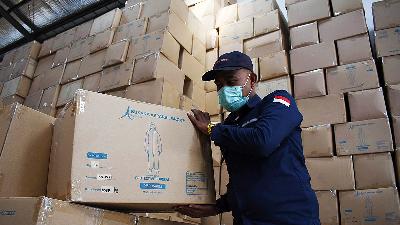
The KPK named three suspects in the corruption case involving personal protective equipment. Other high-ranking officials are also implicated.

The government revises regulations on solar panel and photovoltaic power station’s local content requirement. Investors are hesitant due to unreasonable requirements.

The decision to raise tuition fees, which was later cancelled, shows the lack of empathy in the part of policymakers.
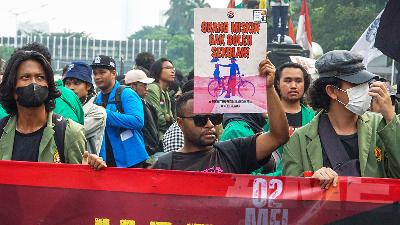
Prospective university students are backing away because they are unable to pay tuition fees. Some tuition reductions fail to make much of a difference.

Minister of Education Nadiem Makarim allegedly approved the recent increase in university tuition fees. It is considered to be an effort to commercialize education.
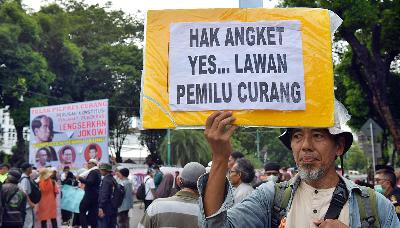
The right of inquiry into election fraud in the DPR effectively failed following announcement of the Constitutional Court’s decision. Only the PKS remains consistent.
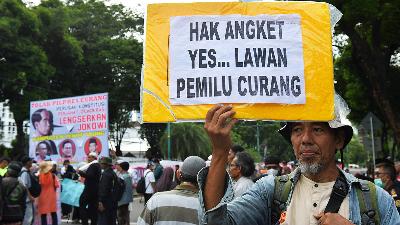
The right of inquiry to investigate alleged fraud in the 2024 elections is threatened to run aground in the House of Representatives (DPR), influenced by offers of ministerial seat in Prabowo’s cabinet.

BTN Syariah is preparing to acquire Bank Muamalat. It is the latest option to improve the financial health of Bank Muamalat, despite the move being rejected by the MUI.

Jokowi is taking Indonesia right back to the start of the Reformasi era. The right of inquiry could be a way to save democracy.

Megawati and Jusuf Kalla are the driving force behind the use of the right of inquiry in the House to investigate election fraud. The coalitions of the Anies-Muhaimin and Ganjar-Mahfud presidential tickets are not solid.
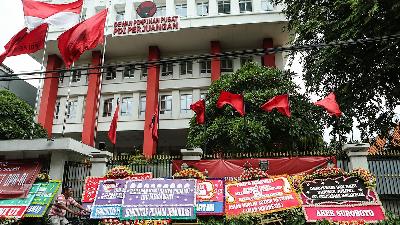
The PPP and NasDem have not expressed strong support for using the House’s right of inquiry to investigate alleged fraud in the 2024 elections. The Prabowo-Gibran camp is offering cabinet positions.
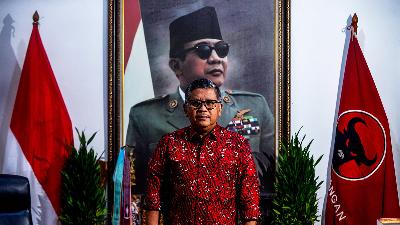
PDI-P Secretary-General Hasto Kristiyanto explains the right of inquiry into alleged fraud in the 2024 General Elections and PDI-P’s chance to become the opposition party.

The coalition that supports the Anies-Muhaimin presidential bid is preparing to propose a House inquiry into election fraud. This effort is still waiting to see where Megawati Sukarnoputri stands on this issue.

President Jokowi is trying to prevent the House from exercising its right of inquiry to investigate election fraud. He is involved in forming the cabinet of Prabowo-Gibran.

Indonesia’s financial market sentiment will be rocked by DPR’s initiative to execute its right of inquiry. Rice inflation is another serious threat.
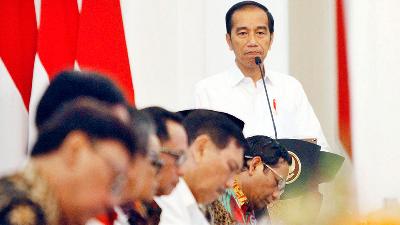
Mahfud Md. finally resigned from the cabinet. Several other ministers intend to follow suit because they are unwilling to support Jokowi’s dynasty.

TikTok Shop’s acquisition of Tokopedia changes the Indonesian business map. It is not clear how small and medium enterprises will be protected.
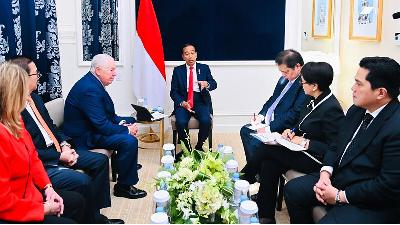
The government is revising the requirement for Freeport’s contract extension. The mining company is mandated to build a smelter in Papua and divest its shares.
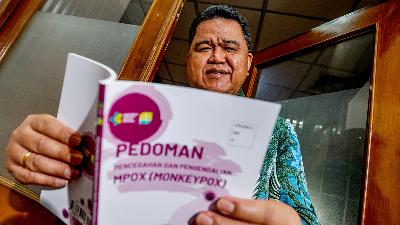
Balinese people refuse the lab-grown Wolbachia mosquitoes designed to prevent dengue fever outbreaks. Meanwhile, there is no evidence that the monkeypox spread is accelerating.

Syahrul Yasin Limpo is the sixth of Jokowi's ministers to be caught up in a corruption case. This is a sign of failure in the recruitment of cabinet members.
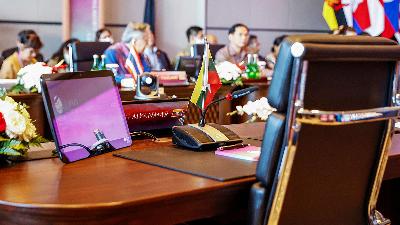
Indonesia uses a quiet diplomacy approach in dealing with the Myanmar crisis. It requires more open and real diplomacy.
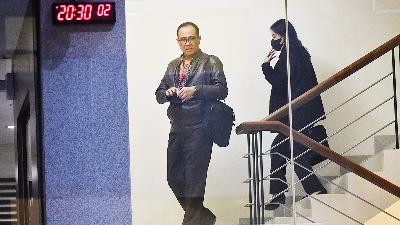
News summary of the week on Rafael Alun Trisambodo’s affirmed status as gratuity suspect and demanded death sentence for Teddy Minahasa.

A letter suggesting Oakland’s concept for building an environmental-friendly Jakarta.

There is an impression that Putin imagines Russia as a continuous unity over the past thousand years — as though the Socialist Revolution of 1917 was merely a continuation of Tsarist rule, as though history is not the process of contradiction and does not leave behind ruins.
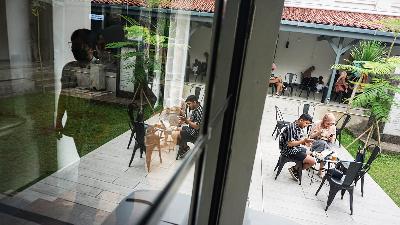
A number of old historical buildings are converted into hangout spots, offering visitors the charms of bygone eras.

The Indonesia Battery Corporation is to acquire a German electric vehicle company. This has the potential to result in losses.
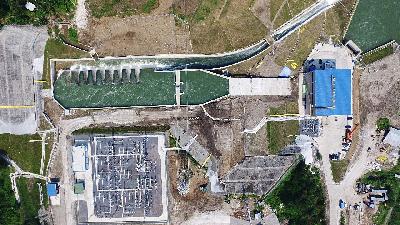
PLN is pursuing funding for the green energy transition in order to meet the 2060 carbon neutral target. Aside from large funds, there are other potential problems.

Ambiguity—others might call it diversity—is being gradually suppressed. Civilization is changing. In capitalist societies, in a life system where science, high technology and administration shape people’s lives, there is no place for ambiguity.

Government reactions are varied on the court verdict handed down in a lawsuit on air pollution. An appeal delays action which should be taken immediately.

Companies listed at the Indonesia Stock Exchange, including state-owned enterprises, are dragged into lawsuits for delaying debt repayment and bankruptcy due to their thinning pockets during the pandemic.

The Bank Indonesia Liquidity Assistance task force implicates Hutomo Mandala Putra in the BLBI case. The resolution still awaits a proposal from the owner of bad debts for the national car program.

State electricity company, PLN, acquired the North Duri Cogeneration Power Plant. Additional expenditures await them at the Rokan Block.
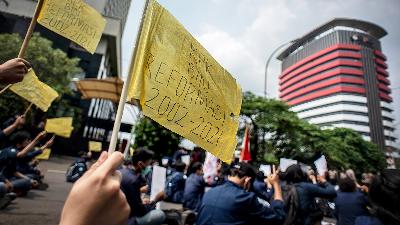
Non-active KPK employees are filing a lawsuit to several institutions against the civic knowledge test. The process of regulating the test is considered as legally flawed.
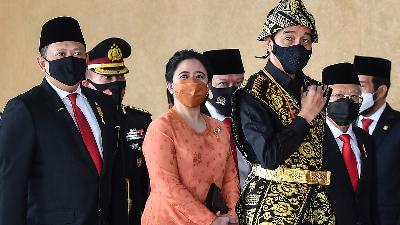
Discussions on state guidelines have yet to reach an agreement. It could be used to topple the president.
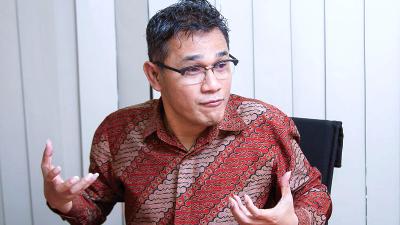
The plan to build Bukit Algoritma or the Algorithm Hill went viral, both on the news and social media. PDI-P politician Budiman Sudjatmiko explains his ideas for the project touted to be Indonesia’s Silicon Valley.

Within the walls of Covid-19 referral hospitals, hundreds of thousands of nurses take care of patients and assist doctors in treating those stricken by the pneumonia-inducing virus. They work for eight to 12 hours every day in their uncomfortably stuffy hazardous materials (hazmat) suit, leaving families behind and facing risk of deadly infection. Until December 23, 4,294 nurses have tested positive for the coronavirus, 159 of them did not survive. The Indonesian Nurses Association said the profession is yet to receive the proper recognition it deserves.
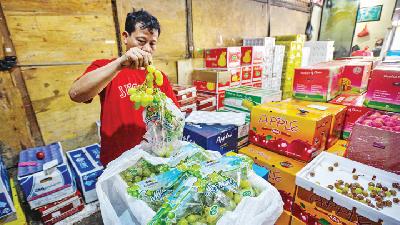
The agriculture ministry’s import quotas and trade ministry’s import permits for horticultural products were issued late. The delay caused fruit imports to miss the harvest season, resulting in scarcity and high prices. Tempo and The Australian Financial Review’s investigation found that the delay was not only caused by administrative reasons but was also due to illegal fees, with rates ranging from Rp1,000 to Rp2,000 per kilogram. This year, Indonesia plans to import over 1 million tons in commodities.

Blood on the leaves And blood at the root Black bodies swinging in the Southern breeze Strange fruit hanging from the poplar trees —Strange Fruit, sung by Billie Holiday, 1939

Uraso may be known as a jengkol (Archidendron pauciflorum) or dogfruit producer, but it was Seliwati who stood behind him.
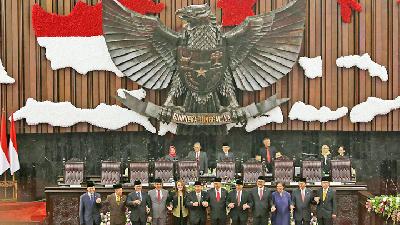
The increase of leaders of the MPR is suspected to pave the way for the amendments of the constitution. Reviving a five-year plan scheme smacks of reviving the existence of State Guidelines, while changing the constitution could very well spread to other articles.
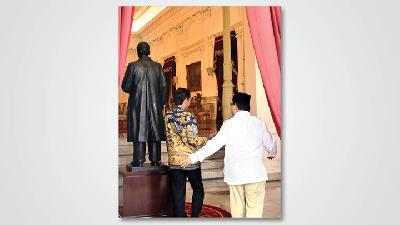
Misguided Reconciliation

Areas previously controlled by ISIS are in ruins. A few remaining combatants attack occasionally.

Prabowo-Sandiaga supporters have arbitrarily attacked organizations behind quick count polls. This is a threat to democracy.

Mandiri Bank’s plan to acquire Permata Bank is in line with the desire for consolidation in the banking system. Caution is needed to avoid a mis-step.

*What, DPR building..! What are we doing here? **To become DPR members!

After much anticipation, the US dollar finally soared against the rupiah. Last week, it quickly flew past Rp14,500 and touched the new psychological limit of Rp15,000.
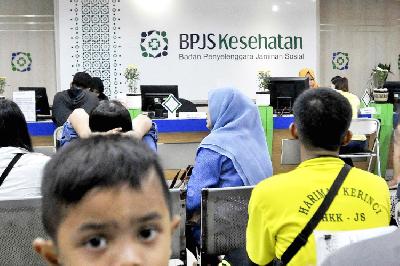
A cancer patient is suing President Joko Widodo because the Healthcare and Social Security Agency (BPJS) has rejected the medicine needed. This is not the first case.

Nur Alam, the non-active Governor of Southeast Sulawesi, has sued an expert witness on the environment. The judge must throw out the lawsuit.

A property buyer for Jakarta’s reclaimed islands is named suspect for harshly criticizing and filing a lawsuit against the developer. Buyers are demanding a full refund.

THE debate over whether or not Indonesia needs to import rice should not have taken place. As long as the government maintained a valid national rice data, rice policy confusion need not have led to the embarrassing stage it has reached today: mutual accusations between ministries. It is quite saddening because this is not the first time that such bickering has occurred.

Banjar Merita is the name behind Bali’s famous arak. Located in Bali’s Karangasem Regency, it is the producer of the island’s popular palmyra liquor. Hundreds of households in the banjar—the Balinese equivalent of a hamlet—are familiar with the centuries-old tradition of distilling arak, passed on over generations. Now, traditional Merita arak has penetrated the tourism industry and has spread its wings beyond Bali. Locals believe that their arak’s exquisite taste is due to the blessings of Ida Bhatara Arak Api, the god of fire.

Though some of Indonesia’s cuisine may be quite well-known, only a handful of regional dishes—such as from Padang, West Sumatra—are truly popular, despite the archipelago’s vastness and its 34 provinces. To popularize local Papuan cuisine, Charles Toto has formed the Jungle Chef Community. The Papuan chef gathers food ingredients from the forest and prepares these ingredients with an international flair. Meanwhile, Meliana Christanty shares Kalimantan’s traditional recipes on social media. At the end of September, the tourism ministry held the Wonderful Indonesia Culinary and Shopping Festival (WICSF) 2017 in 18 Indonesian cities to promote the country’s culinary traditions. Tempo English reports.

A long joke can be funny and then become serious. One long joke in history was written by Miguel de Cervantes in 17th-century Spain: I am talking, of course, of Don Quixote, a novel of more than one thousand pages.

Suspected bribery involving DPR legislators in the electronic ID (e-KTP) project has triggered a move to apply the Right of Inquiry on the Corruption Eradication Commission (KPK), to force the anti-graft agency to open its criminal investigation on the project to the public. Other politicians not implicated by the e-KTP scandal are calling for the Right of Inquiry on account of other corruption cases. Their ultimate objective is to revise the KPK Law so as to revoke its authority to conduct electronic surveillance.

THE app-based transportation service provider Grab Inc has acquired Kudo, an online-to-offline e-commerce company. Last Monday, in a written statement, Grab said Kudo would be integrated into the GrabPay payment platform.

Muhammad Samsul Rizal married his wife when she was 16, unaware of the risks of child marriage. Guilt has prompted him to work against child marriage and produce a film to raise awareness on a problem commonly found in his region.

The House of Representatives' (DPR) Gerindra faction initiated an inquiry to investigate the Home Ministry's refusal to remove Jakarta Governor Basuki Tjahaja Purnama from office, despite his status as a defendant in a religious defamation case. We propose a special committee for an inquiry into theAhok Gate' case, in relation to the misuse of authority of the Criminal Code and Law No. 23/2014 on Regional Governance," said Gerindra Party deputy chairman Fadli Zon said, two weeks ago.

Sukarno's seminal Pancasila speech of June 1, 1945 effectively laid down the philosophical and political foundations of the Indonesian Republic. The concept of Pancasila (Five Principles), authored by the country's future first president during the Japanese occupation, is the basis of Indonesia's civilized rule. The government urges all Indonesians to honor this state ideology as their fundamental political philosophy.
Considered crucial to national unity, the emblem and the words of the five sila, or principles, are displayed in practically every government office: 1) Belief in one supreme God; 2) Nationalism, the unity of Indonesia; 3) A just and civilized humanity; 4) Democracy, guided by the wisdom of unanimity arising from discussion (musyawarah); 5) Social justice, the equality of political rights and the rights of citizenship, as well as social and cultural equality.

Efforts to revive the Broad Guidelines of State Policy (GBHN) should not continue. If they came to pass, they would turn back time and Indonesia could revert to the New Order regime. We should not forget that the GBHN, which was drawn up and passed by the People's Consultative Assembly (MPR), was removed through the long process of amending the 1945 Constitution.
Following four amendments carried out between 1999 and 2002, the Constitution now places the MPR as a state institution at the same level as the President. Its duties and functions no longer include appointing the President, because the President is now directly elected by the people and he no longer has to be accountable to the MPR.

Forty-five documents of great interest were found among the 11.5 million documents of the Panama Papers. If they were printed, they would not be more than half a ream of paper. They are all connected with the activities of an offshore company owned by businessman Edi Yosfi.
There are at least four companies in the Panama Papers that are connected to Edi: Saxenburg Enterprises, Palomino Energy Ketapang, Hollingsworth Group and Kingswood Capital. These four companies were registered by the law firm Mossack Fonseca at the same address: Akara Building, Tortola, British Virgin Islands.

LILY Yulianti Farid never thought the Makassar International Writers Festival (MIWF) that she initiated in 2011 would ever get off the ground. She noted, furthermore, that few members of the literary circles in her hometown had joined the event.
Lily said that participants at the MIWF were mostly below 35 years of age. It is quite different from Melbourne, the city where she currently resides, where older people are usually the ones who organize book clubs.

Nothing seemed amiss with the multistory, glass-walled building on Jalan Buncit Raya No. 49 in the Mampang Prapatan area in South Jakarta last week. A receptionist sat in the lobby and two security guards stood out front. "This is the office of Amanah Prima Indonesia company," said Ali, one of the security guards. He said there were no other companies located in the building.
This office was not unfamiliar. Tempo had visited the building eight years ago to investigate the purchase of Zatapi crude oil by Pertamina. At that time, it was the office of oil businessmen Mohamad Riza Chalid, Johnny Gerald Plate, Irawan Prakoso and Schiller Marganda Napitupulu. The four are involved in running the company and being shareholders in Global Energy Resources Pte. Ltd. and Gold Manor International Ltd. Global and Gold Manor allegedly conspired with Pertamina officials, and all this led to the company's loss of about Rp65.5 billion in the Zatapi oil purchase.

The National Commission on Human Rights (Komnas HAM) last week released the results of the country's first-ever national inquiry into indigenous rights abuses, capping more than a year's probe into the drivers of escalating indigenous land conflicts, which have doubled in recent years.
The findings, released in the form of four books, are the result of Komnas HAM-directed investigations into 40 carefully selected conflicts between indigenous communities and companies in Sumatra, Java, Bali, Sulawesi, Kalimantan, Maluku and Papua provinces. The cases involved a series of public hearings that gave company representatives and indigenous persons the chance to air competing grievances.

There is a story about a Bedouin living far from Damascus, in the interior of Syria, who was disappointed when he rode a train for the first time. "I'm not satisfied," he complained to his friend. "The ticket was expensive, but the journey ended too quickly."
This might sound stupidlike other stories city people make up to poke fun at country peoplebut actually the Bedouin makes modern people aware: reaching someplace 'quickly', which to most of us is the formula of achievement in our times, might not equate the value of experience. Speed produces results but at the same time wards off something else.

Palembang District Court seemed determined to close the year 2015 with an absurd verdict -throwing out the government's lawsuit against Bumi Mekar Hijau company. This log supplier to the Asia Pulp and Paper group was accused of deliberately of torching a 20,000-hectare forest.
The government, as represented by the forestry and environment ministries, sued the company for Rp2.6 trillion in losses plus an additional Rp5.2 trillion for environmental restoration. Actually, if all is taken into careful consideration, including the profound and extensive effects on the environment and human health, the amount is far from adequate. But the panel of judges headed by Parlas Nababan allowed Bumi Mekar Hijau to go scot-free.

It is rare to find anyone at the State-Owned Enterprises (SOE) minister's official residence in South Jakarta. Normally, SOE Minister Rini Soemarno will stop by the house only about once a month. "On Wednesday last week, some 15 wives of government officials visited the house," said Andi, the house security guard, at the Widya Chandra housing complex.
The house has come under the public spotlight after Indonesian Democratic Party of Struggle (PDI-P) politician Masinton Pasaribu filed a report with the Corruption Eradication Commission (KPK) on alleged gratuities carried out by Pelindo II CEO Richard Joost Lino. As evidence, Masinton produced an official note from Pelindo II to its subsidiary, Pelabuhan Tanjung Priok, dated March 16, regarding a transfer of Rp200 million for the procurement of goods for Minister Rini's official residence.The note, a copy of which was obtained by Tempo, indicates that the money was spent on one long sofa worth Rp35 million, two small sofas worth Rp25 million and a set of office equipment worth Rp59 million. In addition, there was also the purchase of a Rp10 million sofa table plus six dining-room table seats, priced at Rp3.5 million each.

The 33rd Nahdlatul Ulama (NU) Convention in Jombang, East Java, in early August will be a nostalgic journey for Martin van Bruinessen, who spent considerable time in Indonesia during the 1980s and 1990s. As a resource person at the pre-convention discussions, Bruinessen, the Dutch professor from Utrecht University, author of a number of books on Islam in Indonesia, was sought after to speak on the future direction of the the NU, currently led by KH Said Aqil Siroj.
In the opinion of Dutch anthropologist Bruinessen, the NU has an important role to play in society. He knows his subject matter well, given his nine years in Indonesia. Although he now resides in the Netherlands, he still devotes much of his time to Islamic literature, in the form of discussions and studies on intellectual development in Indonesia. This has led Bruinessen to deepen his knowledge on Islamic thinking in Indonesia, and that of the NU.

A message forwarded on WhatsApp appeared on Alfatih Timur's cellphone, two weeks ago. It was an appeal from the Indonesian Red Crescent to help the victims of the recent rioting at Papua's Karubaga district of Tolikara regency.
Alfatih, the 24-year-old manager of kitabisa.coma social fundraising websitewas moved, and shared it with another website manager, Vikra Ijaz. After some discussion, the two agreed to get help for Tolikara. "We must do fundraising," he said last week. They agreed that funds were needed to rebuild the mosque which burned down in the rioting.

A long joke can be funny and then become serious. One long joke in history was written by Miguel de Cervantes in 17th century Spain: I am talking, of course, of Don Quixote, a novel of more than one thousand pages.

The entire leadership of the Judicial Commission agreed to impose the sanction of suspension on the judge of the South Jakarta District Court, Sarpin Rizaldi, who presided over the pre-trial hearing of a lawsuit filed by Commissioner-General Budi Gunawan. In the commission's session held on Tuesday last week, Sarpin was judged as having violated the ethical code and guide of conduct for judges.

The meeting between the chief of the Corruption Eradication Commission (KPK) and the Board of Commissioners of Telkom two weeks ago lasted two hours. The purpose of the meeting was to discuss the state-owned enterprise's plan to swap shares of Telkom in Dayamitra Telecommunications (Mitratel) for shares in Tower Bersama Infrastructure (TBIG).
Telkom Commissioner Hendri Saparini arrived at the KPK building in Jakarta accompanied by three independent commissioners, namely Parikesit Suprapto, Johnny Swandi Sjam, and Virano Gazi Nasution. They were welcomed by interim KPK chairman Taufiequrrahman Ruki, and current KPK vice-chairman Johan Budi Sapto Prabowo. State-Owned Enterprises (SOEs) Minister Rini Soemarno had been invited to the meeting but was not present.

Few non-Dayaksthe word refers to the various indigenous peoples of Borneoare familiar with their cuisine. Even people living in Kalimantan often do not know it. Take Tiur Sitompul. A Batak woman, she was born and raised in Pontianak, West Kalimantan. But Dayak cooking never defined her family's menu. The local restaurants where she ate only sold Chinese food. "There were no other restaurants or any community-members selling this cuisine," she told Tempo last month at a 'Finding Indonesian Flavors' dinner, organized by the I Love Indonesian Cuisine (ACMI) community.
That scarcity was why Tiur and dozens of others at the event were amazed to see more than 10 authentic Dayak dishes lined up on the table at the Almond Zucchini cooking studio in Prapanca, South Jakarta. Large saucepans held richly colored, tantalizing combinations of processed chicken, meat, eggs and shrimp.

One white house stood out as cleaner than the rest. Its arched wood-frame windows and wooden doors and the small garden outside betrayed a Spanish sensibility. It was the childhood home of Nobel Prize-winning Peruvian author Jorge Mario Pedro Vargas Llosa, as well as the site of a new museum about his life.
The museum resides on Avenida Parra 101 at Arequipa, Peru's second largest city, known for its mining industry. Arequipa lies southeast of Lima, the capital of Peru, near Mount Misti and the border with Chile and Bolivia. It contains around 844,000 people, as well as the site of the open-pit Cerro Verde copper mine, operated by a subsidiary of US-based Freeport McMoRan, which also handles the massive Grasberg mine in Indonesia's Papua province. Arequipa is a 90-minute flight, or a 17-hour bus ride from Lima.

The old tin suitcase was battered. Almost empty. But in Pramoedya Ananta Toer's famous tetralogy, this inconsequential item becomes ballast for connecting a long story, a bitter history.
The suitcase is a sign of trauma.

Weak Evidence, Weak Testimony
Iwik retracted his confession. Not a single shred of the prosecutor's evidence was backed up by witnesses.
THE verdict against Dwi Sumaji alias Iwik, accused of murdering daily newspaper Bernas reporter Fuad M. Syafruddin, was scheduled to be announced on November 27 1997, 113 days after the court commenced hearing the case. Unexpectedly, the state prosecutor, who had initially indicted him on charges under four inter-related Criminal Code articles, instead submitted a request that Iwik be acquitted and released of all charges.
Iwik's fate then lay completely in the hands of the panel of judges, led by Endang Sri Murwati, who was also the chief justice of the Bantul State Court.

ENTERING the final quarter of this year, Muliaman Hadad is forced to do acrobatics. Fierce competition within the banking industry in recent months has caused Muliaman, who is chairman of the Financial Services Authority (FSA), great anxiety. "I have to cut the banks' business plans. Credit growth was still 20 percent, we reduced it to 16-17 percent, to slow down the race for liquidity," the former deputy governor of Bank Indonesia told Tempo two weeks ago.
For quite some time, growth in customer funds could not keep up with growth of credit. As of August this year, 92 percent of third-party funds in banks have been disbursed as loans. Not much money is left. The scramble to attract customers has become aggressive. A war of interest rates is inevitable, and in the long run, this could affect the economy. If it is allowed to go on, small banks not strong enough to compete, would collapse.

ON October 13, Facebook founder Mark Zuckerberg visited Indonesia for some face time with President-elect Joko Widodo. In their 45-minute meeting at Jakarta's City Hall, Zuckerburg expressed his interest in working with the new government to expand Indonesians' access to cheap Internet. "To help make connections, increase businesses and open new job opportunities," Zuckerburg said.
Zuckerberg said he also wanted to increase Internet penetration, produce solutions to basic infrastructure problems and help make data costs more efficient through internet.org, a Facebook-led project that aspires to make Internet ubiquitous. "Our discussions were mainly focused on Jokowi's economic plan," Zuckerburg said, referring to Joko by his nickname.

Hivos to Build Biogas Project in Sumba
Hivos, a Dutch humanitarian agency, is planning a biogas project for Sumba Island, East Nusa Tenggara. From August 31 to September 6, Hivos sent two expedition teams to chart suitable areas for bio-digester installations on the 11,153-square-kilometer island.
"Our main reason is to open access to a renewable source of energy on this third-poorest island in Indonesia," Hivos spokesperson Dewi Suciati said in a press conference at Hotel Grand Kemang in South Jakarta.

PERTAMINA's intention of becoming a world-class company by 2025 could flounder. A number of its overseas investments have not yielded the hoped-for results. In fact, investments in foreign oil fields were expected to boost Pertamina's production to 2.2 million barrels of oil equivalent per day (boepd) by 2025.
In 2025, Pertamina targets production capacity of 900,000 barrels from domestic fields and 600,000 barrels from its overseas expansion. "The rest will come from increases in participatory rights and elsewhere," Pertamina spokesman Ali Mundakir said last week.

Dewi Anggraeni*
Indonesia, my native country, has just turned 69. As it happens every year, I became sentimental. I have now lived over half of my lifetime-happily-in Australia, frequently spending time in Indonesia. I still have, embedded in my psyche, attitudes I associate with living in Indonesia. For instance, I respect age seniority-though I must say as a sexagenarian there are increasingly fewer people senior to me nowadays-and a certain degree of chaos does not perturb me as much as it does my Australian relatives. A certain degree, I've had to emphasize, because the Indonesian version of queuing, or not queuing rather, drives me senseless. Interesting to see how a people usually so well-mannered and courteous turns instantly unscrupulous in front of a manned table, window or anything from where they have to obtain something.

Through its subsidiary, Medco Tunisia Petroleum Limited, Medco Energi Internasional (MedcoEnergi) acquired Storm Ventures International, a Barbados company operating in Tunisia. MedcoEnergi spent US$127.7 million (Rp1.49 trillion) of its internal funds to obtain all of Storm's shares. "This transaction will add to our overseas assets portfolio and support the company's future growth," MedcoEnergi CEO Lukman Mahfoedz said after signing the acquisition agreement in Tunis, the capital of Tunisia.
Storm is a subsidiary of Chinook Energy, listed in the Toronto Stock Exchange, Canada. The purchase gives Medco control of eight oil and gas fields, which include four exploration blocks, two development blocks and two production blocks. Five of these reside on land while the others are situated offshore, and they all have a concession time of either 30 or 50 years. The acquisition floor price amounts to US$114 million, with the rest of the funds to be used as working capital.

The first animal Alan Knight rescued was a sloth bear in India named Raju, but it didn't stop there. He has spent the last 25 years saving threatened animals from all over the world, including several critically endangered species in Indonesia. Alan Knight was born and brought up in Romford, Essex, in the east of London, UK. From the start, the young boy loved animals from his very first pet cat Pandy and his Golden Retriever puppy Kim. Alan bred butterflies for releasehis boyhood dream was working on a butterfly farmand he was always rescuing animals and bringing them home.
Realizing his affinity for our fellow creatures, his parents encouraged him to get a degree in Biology, which is exactly what he ended up doing.In 1974, Alan went into business making microscopes for schools, developing a series of microscopes that changed the design rules. In 1999, after 25 years of making scientific instruments and rising to chairman of the SOL Group, he left the business to work full time for International Animal Rescue of the UK. The following is an interview with Knight by contributor Bill Dalton:

Akil Mochtar could spend the rest of his life in jail. The panel of judges at the anticorruption court agreed with the prosecutors that the crimes committed by the former head of the Constitutional Court were very serious, and that he therefore should receive the maximum sentence: life imprisonment. For the first time, the court handed down the maximum jail term for a law official found guilty of corruption and taking bribes.
A 20-year sentence had been imposed on Urip Tri Gunawan, a prosecutor who accepted a bribe from Artalyta Surayani in connection with the controversial Bank Indonesia Liquidity Assistance funds program. But a court had also handed down a lenient sentence of four years in jail to Syarifudin Umar, who took bribes in the bankruptcy case of Sky Camping, despite the prosecution demand that the judges sentence him to a 20-year jail term.

In the ocean about 100 meters from Senggigi Beach in Lombok, West Nusa Tenggara, artist Teguh Ostenrik tried to catch his breath back. Floating on the water, he let the waves rock his body back and forth and released the breathing hose connected to the air tank on his diving suit.
Teguh was taking a break from moving his installation Domus Sepiae into the sea, an effort that required eight divers from Gili Eco Trust, a nonprofit organization. "In Indonesian, Domus Sepiae means squid house," Teguh said on Friday two weeks ago.

There is something interesting when power begins with a story about words and coconut juice.
We find this in the Javanese tale about the founder of the Mataram kingdom.

Bank Mandiri has acquired Bank BTN. Not everyone is enthusiastic about the prospect.

Kaharingan, a faith of Central Kalimantan, has long been lumped with Hinduism for bureaucratic purposes. Now its adherents are moving to break away.

Last month, hundreds of fruit farmers and students demonstrated against the Trade Ministry in Jakarta, calling for a ban of imported apples. Various kinds of the fruit from diverse countries were undercutting apples grown in Malang, East Java, the country's apple growing center. But apples are not native to Indonesia, unlike the 450 known fruits such as the quixotic durian, the mangosteen, mango, salak and soursop. Why can only few of these compete with imported fruits within the country? Ironically, they are so unique, other countries have managed to reproduce them, often with better results. Alarmed at the potential loss of these horticultural treasures, a movement has begun to campaign for the restoration of rare and native fruit trees of Indonesia. Tempo English looks at the different ways native fruit cultivation is being revived and preserved.

Bank Jawa Barat dan Banten's internal audit into the purchase of a Rp500 billion building revealed a division head to be the sole culprit. The embezzlement caused state losses in billions of rupiah.

Out of necessity rather than choice, increasing numbers of women in the Asia-Pacific region are changing their traditional role and turning to business enterprises, whether in or out of their homes. Despite the challenges presented by and sustainability, more and more are daring to venture into the world of marketing, to invest in training and learn to cope with information technology.
Women in the 21st century must inevitably and carefully manage their time, to ensure their primal duty as wife and mother do not become impediments to their new role as the family's primary or secondary income earner.
The following stories look at elements of equity and sustainable growth: the role of women entrepreneurs in the economy, dilemmas in the search for food security and the blue economy as a neglected but highly potential alternative sector.

To fund his research, I Made Budi produces extract, capsules and chocolate from the red fruit of the pandan plant in Jayawijaya, Papua. When the price of the fruit skyrocketed, people raced to plant it.

According to the Central Bureau of Statistics, in 2010 fruits contributed 53 percent to the GDP of horticultural products, valued at about Rp 46 trillion. In a number of provinces, the commercial cultivation of fruits have brought some prosperity to the farmers. Besides being directly consumed, fruits can be processed to become snacks and even medication. Even so, it is still not getting enough attention and support from the government. Tempo English reports from the provinces of Jambi and Papua, on the recent commemoration of National Fruit Day on July 1.

Importing fruits was to be restricted, then cancelled. Policies should include incentives to encourage the commercial cultivation of local fruits.

The little known starfruit, grown abundantly in the orchards of East Java, is rapidly gaining popularity for its juice and health benefits.

DariatmoinMalang,EastJava,has developed a carved guitar home industry.With a start-up capital of Rp500,000, his monthly turnover now reachesRp60million.Dariatno adorns his guitars with carvings ofwayangepisodes, to popularize Indonesian culture abroad.

Bali-based, American-born writer Bill Dalton, who has lived in Indonesia for more than four decades, and his Indonesian wife decided to convert to Bali Hinduism last year. The following is a description of his unique experience.

Andrian Ishak has pioneered molecular gastronomy in Indonesia. He has applied many new cooking methods to the cuisine of the archipelago.

He built the roads which gave access to villages in remote mountain areas. After he disbursed the funds for health and education, he focused on improving the city in his final year.
Independent journalism needs public support. By subscribing to Tempo, you will contribute to our ongoing efforts to produce accurate, in-depth and reliable information. We believe that you and everyone else can make all the right decisions if you receive correct and complete information. For this reason, since its establishment on March 6, 1971, Tempo has been and will always be committed to hard-hitting investigative journalism. For the public and the Republic.